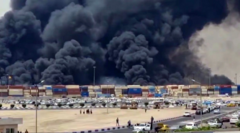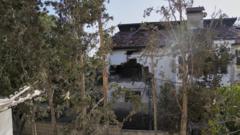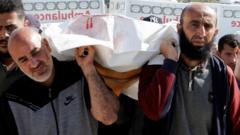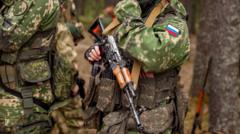Following a major blast at Shahid Rajaee port, which claimed the lives of over 40 individuals and injured more than 1,000, residents are shifting from mourning to outrage. Questions about the handling of hazardous materials and the government's preparedness are mounting, as health concerns linger with toxic smoke blanketing the area.
Iran's Tragedy: Massive Port Explosion Sparks Outrage Amid Grieving Families
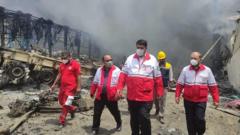
Iran's Tragedy: Massive Port Explosion Sparks Outrage Amid Grieving Families
A catastrophic explosion at Iran's Shahid Rajaee port has left devastation in its wake, killing dozens and injuring many more, prompting widespread anger and demands for accountability.
In a harrowing incident that has shaken the nation, Iran's Shahid Rajaee port experienced a catastrophic explosion on Saturday, resulting in the deaths of at least 40 people and injuries to over 1,000 others. In the aftermath, the normally bustling port has become a scene of chaos, with thick black smoke continuing to rise as emergency responders battle raging fires that have yet to be extinguished. Hospitals across the country were filled with citizens rushing to donate blood as the nation grapples with the repercussions of this tragedy.
Authorities have declared a national day of mourning, and an additional two days of mourning in Hormozgan province, as local communities cope with the grief of the losses. However, beneath the surface of sorrow, there is rising anger directed at the authorities. Many are questioning why highly flammable materials were apparently mishandled and whether proper safety protocols were followed at the port. Speculation is rife regarding the nature of the materials involved, with some sources suggesting that the explosion stemmed from improperly stored solid fuel, linked to Iran's ballistic missile program.
The explosion has sparked a blame game within the Iranian regime, as citizens are demanding answers about the conditions leading to this disaster. President Masoud Pezeshkian visited the scene and has called for a thorough investigation into the events that transpired, while defense ministry officials categorically deny any military-related cargo at the port.
The economic implications of the port’s closure raise additional concerns, as it handles roughly 80% of Iran's imports. Authorities first warned of potential food shortages but later retracted statements indicating that only a portion of the port was affected. In a show of international solidarity, condolences have poured in from numerous countries, including Russia, the UAE, and Turkey, while China's foreign ministry confirmed the stability of its citizens who were injured in the incident.
As high-level talks regarding Iran's nuclear program continue elsewhere, citizens at the heart of this tragedy are left to contend with grief, anger, and the demands for accountability from their government.







